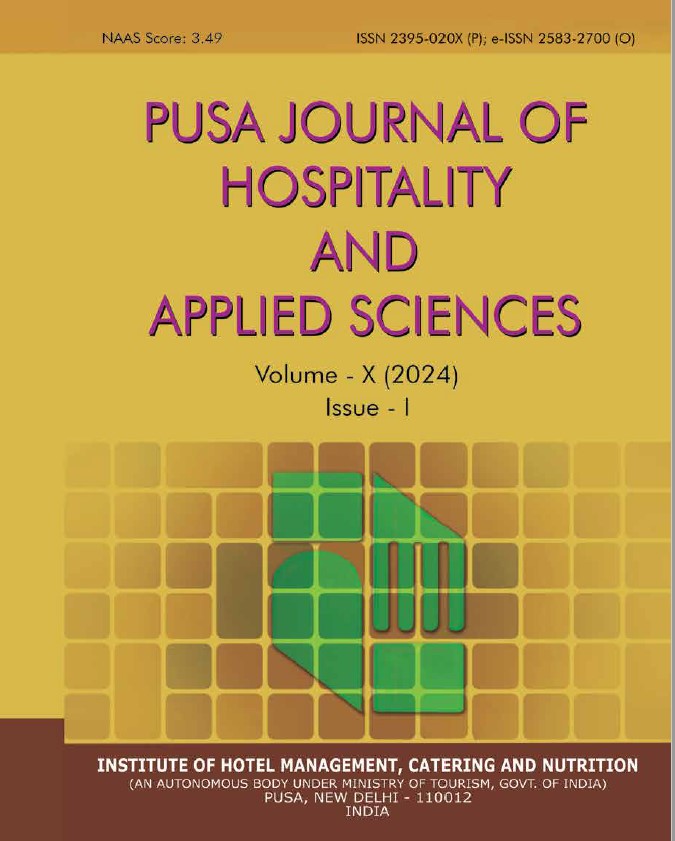Factors Affecting The Career Choices Of Undergraduates In Campus Recruitment
Keywords:
Undergraduates, Hotel Management, influencing factors, career choices, recruitmentAbstract
Background: Hotel Management Institutes have seen a tremendous growth in the recent years. More and more students are inclining to pursue the course at the national level in various institutes. Selecting a career path is very significant step in person’s life as it helps to decide how they would live rest of their life. Many factors affect the career choices of an individual. Understanding applicant’s preferences and values become an important aspect for recruiters to develop and update recruitment strategies. Objective: The purpose of the study was to find out the factors influencing the choices of undergraduates during the campus recruitment at IHM, Pusa. Methods: The subjects comprised of students (n=50) from Institute of Hotel Management, Pusa, New Delhi. Questionnaire was used as a tool to gather data on the various factors influencing the career choices. Results: The findings showed that the factors such as job stability & security prospects provided by the company, brand reputation, level of entry in the company highly affects the choices of undergraduates while making a career choice or applying for the recruitment process. Personal factors such as financial condition of home, parental consent, and job location also affects the choices of students to a great extent. Conclusion: Hence it becomes very important for the recruiter to understand the needs of the students to decrease the attrition rate & reduce the recruitment costs.
References
Agarwala, T. (2008). Factors influencing career choice of management students in India. (2008). Career development International 13(4), 362-376.
Andrew, K. J. (2001). Making a career of it? Hospitality students’ future perspectives: an Anglo: Dutch Study. International Journal of Contemporary Hospitality Management, 13 (1), 13-20. 3. Arnold, J., & Davey, M.K. (1994). Graduate experiences of Organizational career management. International Journal of Career Management. 6(1), 14-18.
Bandura, A. Barbaranelli, C., Caprara, G., & Pastorelli,C. (2001). Self-efficacy beliefs as aspirations and career trajectories, child development, 72, 187-206
Beyon, J., Kelleen, T. & Kishor, N. (1998). Do visible minority students of Chinese and south Asian ancestry want teaching as a career? Perception of some secondary school students in Vancouver, BC. Canadian Ethnic Studies 30(2), 50-73.
Carpenter, P. & Foster, B. (1977), The Career decisions of Student Teachers. Educational Research & Perspectives, 4(1), 23-33.
Danziger, N. & Valency, R. (2006). Career anchors: Distributional impact on Job Satisfaction, The Israeli Case. Career Development International. 11(4), 293-303.
Dessler, G. (1997), Human Resource Management, Prentice hall International Inc. United States of America.
Garavan, T.N., Coolahan,M. (1996). Career mobility in organizations: implicationsfor career development- Part-I. Journal of European Industrial Training, 20( 4), 30-40.
Korir, K. (2012). Factors that influence Career Choice of Hospitality Students in Moi University, Kenya. Journal of Education and Practice. ISSN 2222-288X(online) 3(14), 83-90. 11. Kerka, S. (2000). Will we all be portfolio workers? ERIC/ACVE Publication. Retrieved from, http://www.ericacve.org/docgen.asp?tbl=tia&ID=111. October 21,2011
Mondy, R.., Noe, R..M. & Premeaux, R. (1996), Human Resource Management, Prentice hall International Inc. United States of America.
O’leary, S. & Deegan, J. (2005). Career Progression of Irish Tourism and Hospitality Management Graduates. International Journal of Contemporary Hospitality Management, 17 (5), 421-432. 14. Richardson, S. (2009, September 2009). Undergraduates’ perception of tourism and hospitality as a career choice”, International Journal of Hospitality Management, 28(3), 382-388. 15. Srinavasan, S. & Karmakar, A. (2014). Changing perception of students towards Hotel Management course while pursuing the course”, International Journal of Informative & Futuristic Research, ISSN 2347-1697(online), 1 (9), 101-102.




